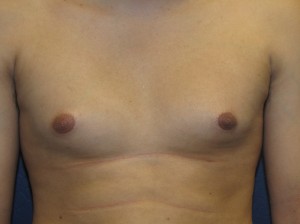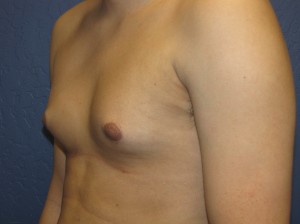Gynecomastia, or male breast enlargement, is a common problem that can afflict a significant percentage of adult males depending on age, medical history, and drug, medication and steroid usage. The negative impact on self-esteem, social interactions and behaviors can be quite substantial. Many men avoid certain sports or activities because they are too embarrassed to expose their “feminized” chest to others which exposes them to the risk of ridicule or derogatory comments. Such behaviors and untoward consequences have been documented in several medical studies.
I have seen many men in their 20’s with the most minimal, virtually imperceptible enlargements who are devastated by their “deformities”. They are in great shape, well sculpted and with a low BMI (body mass index) but they are so bothered and obsessed with their nominal “enlargement”.
Now imagine a teen-age boy – hormones raging, confused, relatively emotional (some males actually have that capacity despite what most women think!), insecure, probing their machismo – and with GYNECOMASTIA!
How exactly do you think he feels?
You would be quite right (and immensely understated) if you said “not very good”.
Unfortunately, there has been little previous research on this age group of affected males despite the fact that up to 69% of boys experience gynecomastia during puberty. Thankfully, though, most will have resolution of their enlarged breasts within 1 – 3 years.
A prospective study was performed at Boston’s Children’s Hospital and Harvard Medical School which investigated the psychosocial impact of adolescent gynecomastia. It used a large sample size, control group and valid survey assessments. The outcome was just published this month in the journal of Plastic and Reconstructive Surgery.
While not totally surprising, the findings were quite important and eye-opening including. Self reported social and mental health are notably impacted including reduced self-esteem and social interactions. There was an association with depression, anxiety, adjustment disorders, suicide ideation, disordered eating behaviors and thoughts (though they didn’t exceed the threshold for eating disorders). These boys frequently experienced embarrassment, humiliation, rejection and teasing as a consequence of their gynecomastia. One very interesting and not so intuitive finding was that those adolescents with very minor breast enlargement could be just as severely impacted as those with far more substantial enlargements.
The findings from this comprehensive study as well as from other smaller studies and case reports and from personal observations, all point to gynecomastia being much more than just a cosmetic issue (which is how it has been largely treated in the past). It clearly has a major negative psychosocial impact on those boys who are afflicted with male breast enlargement. Consequently, there needs to be serious consideration for earlier treatments including surgical intervention.
For more information on gynecomastia and male breast reduction surgery or to schedule a complimentary consultation with me, please contact my office at 480-451-3000.
Steven H. Turkeltaub, M.D. P.C.
Scottsdale and Phoenix, Arizona


